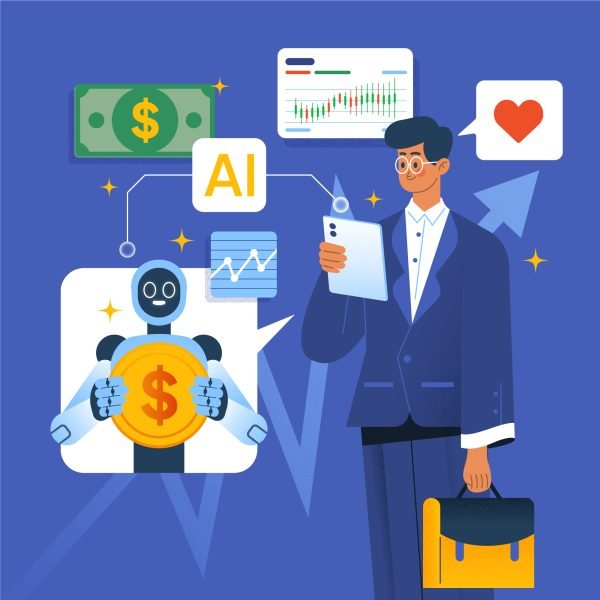
Introduction
Artificial intelligence (AI) has become a game-changer in the world of digital marketing. As technology continues to advance at a rapid pace, businesses need to adapt and embrace AI to stay ahead of the competition. From chatbots and personalized recommendations to predictive analytics and automated advertising, there are countless ways AI can revolutionize marketing strategies. In this blog post, we will explore how to effectively use AI for digital marketing activities in 2024 and beyond.
The future of digital marketing: AI technology
The future of digital marketing is undoubtedly intertwined with AI technology. With its ability to analyze vast amounts of data and make intelligent predictions, AI has the potential to transform the way businesses connect with their audience.
One of the key areas where AI is set to make a significant impact is in customer targeting and segmentation. By utilizing AI algorithms, businesses can identify patterns and behaviors that can help create highly targeted marketing campaigns. This not only ensures a better return on investment but also enhances the overall customer experience.
Additionally, AI-powered chatbots have already proven their worth in providing instant and personalized customer support. With advancements in natural language processing, chatbots will become even more efficient at understanding and responding to customer queries, allowing businesses to provide round-the-clock support.
In the upcoming years, we can expect AI to further streamline digital advertising processes by automating tasks such as ad creation, placement, and optimization. AI algorithms can analyze data in real-time, allowing marketers to make data-driven decisions and allocate their budgets more effectively.
In conclusion, the future of digital marketing lies in harnessing the power of AI. By embracing AI technology, businesses can not only improve their marketing strategies but also enhance the overall customer experience. In the next section, we will explore some of the specific AI-powered tools and techniques that marketers can utilize in 2024 to drive better results.
Benefits of using AI for digital marketing activities
As we look towards 2024, it is crucial to understand the benefits that come with utilizing AI in digital marketing activities. The integration of AI technology offers several advantages that can significantly impact a business’s marketing efforts.
Firstly, AI enables businesses to gain valuable insights into their target audience. By analyzing vast amounts of data, AI algorithms can identify patterns and behaviors that help in creating highly targeted marketing campaigns. This not only ensures a better return on investment but also enhances the overall customer experience.
Secondly, the use of AI-powered chatbots allows for instant and personalized customer support. With advancements in natural language processing, chatbots can effectively understand and respond to customer queries, providing round-the-clock assistance. This level of support enhances customer satisfaction and loyalty.
Furthermore, AI can streamline digital advertising processes by automating tasks such as ad creation, placement, and optimization. Real-time data analysis enables marketers to make data-driven decisions and allocate their budgets more effectively. This leads to more efficient and impactful advertising campaigns.
In conclusion, incorporating AI into digital marketing activities brings numerous benefits, including improved targeting, enhanced customer support, and optimized advertising processes. The next section will delve into specific AI-powered tools and techniques that marketers can leverage in 2024 to drive better results. Stay tuned!
Implementing AI in your digital marketing strategy
Now that we understand the benefits of utilizing AI in digital marketing activities, let’s explore how you can implement AI in your own marketing strategy in 2024. With the advancements in technology, there are a plethora of AI-powered tools and techniques that can help you drive better results and stay ahead of the competition.
One of the key areas where AI can make a significant impact is in customer segmentation and targeting. AI algorithms can analyze vast amounts of data to identify and categorize your target audience more accurately. By understanding their preferences and behaviors, you can tailor your marketing campaigns to resonate with them effectively.
Another way to leverage AI is through content creation and curation. AI-powered tools can generate personalized content based on user data and preferences. This not only saves time and resources but also ensures that your content is engaging and relevant to your audience.
Additionally, AI can help optimize your digital advertising efforts. By continuously analyzing and learning from real-time data, AI algorithms can make data-driven decisions about ad placement, targeting, and optimization. This ensures that you allocate your budget wisely and maximize the impact of your advertising campaigns.
Lastly, chatbots and virtual assistants are becoming increasingly popular in providing instant and personalized customer support. AI-powered chatbots can understand and respond to customer queries, provide recommendations, and even complete transactions. Integrating chatbots into your customer service strategy can improve response times, enhance customer satisfaction, and free up your team for more complex tasks.
In the next section, we will dive deeper into specific AI-powered tools and techniques that can elevate your digital marketing efforts in 2024. Stay tuned to discover how you can leverage AI to stay at the forefront of the evolving digital landscape.
Tools and platforms for AI-enabled digital marketing
In this section, we will discuss some of the top tools and platforms that can empower your digital marketing efforts with AI in 2024. These tools are designed to streamline processes, enhance customer experiences, and drive better results. Let’s explore them in more detail:
- AI-Powered Analytics: Platforms like Google Analytics and Adobe Analytics are incorporating AI capabilities to provide deeper insights into user behavior, preferences, and trends. These tools can help you make data-driven decisions and optimize your marketing strategies based on real-time data.
- Personalization Engines: AI-driven personalization engines, such as Evergage and Dynamic Yield, enable you to deliver highly targeted and relevant content to individual users. By analyzing user data, AI algorithms can recommend personalized products, offers, and experiences, resulting in higher engagement and conversions.
- Voice Assistants and Voice Search Optimization: As voice search becomes more prevalent, leveraging AI-powered voice assistants like Amazon Alexa and Google Assistant can help you reach a wider audience. Optimizing your website and content for voice search using tools like VoiceMetrics and RankZero can give you a competitive edge.
- AI-Powered Chatbots: Chatbots have become an essential part of customer support. AI-powered chatbot platforms like Zendesk and Chatfuel can handle customer queries, provide recommendations, and even process transactions, improving customer satisfaction and freeing up your team’s time.
- Programmatic Advertising: Programmatic advertising platforms like Google Ads and Facebook Ads are leveraging AI to automate ad buying, targeting, and optimization. These tools can help you reach your target audience effectively and maximize the ROI of your advertising campaigns.
By incorporating these AI-enabled tools and platforms into your digital marketing strategy, you can enhance efficiency, improve customer experiences, and stay ahead of the competition in 2024. In the next section, we will discuss best practices for implementing AI in your marketing activities.
Best practices for utilizing AI in digital marketing campaigns
As AI continues to shape the future of digital marketing, it is crucial to understand how to effectively implement and utilize AI in your marketing campaigns. Here are some best practices to consider:
- Set clear goals: Before incorporating AI into your digital marketing efforts, clearly define your goals and objectives. Whether it’s increasing website traffic, improving conversion rates, or enhancing customer engagement, having well-defined goals will help guide your AI strategy.
- Data quality and relevance: AI relies on data to generate insights and make informed decisions. Ensure that you have accurate and relevant data to train your AI models effectively. Regularly analyze and clean your data to maintain data quality.
- Continuous learning and optimization: AI systems thrive on continuous learning. Regularly monitor and analyze the performance of your AI-driven campaigns. Use the insights gained to make improvements and optimize your strategies for better results.
- Collaboration between AI and human experts: While AI can automate certain tasks, don’t underestimate the value of human expertise. Collaboration between AI and human marketers can lead to more successful campaigns. Use AI to enhance human decision-making, creativity, and strategic planning.
- Regular monitoring and adaptation: The digital landscape is constantly evolving, and AI strategies need to adapt accordingly. Continuously monitor industry trends, consumer behavior, and technology advancements. Stay informed and be willing to adjust your AI-driven campaigns to stay ahead of the curve.
By following these best practices, you can harness the power of AI to make your digital marketing campaigns more efficient, targeted, and successful. In the next section, we will discuss some emerging AI trends to watch out for in the digital marketing industry. Stay tuned!
Monitoring and optimizing AI-powered digital marketing efforts
Once you have implemented AI in your digital marketing campaigns, it is crucial to continuously monitor and optimize your efforts. Here are some key steps to take:
- Track performance metrics: Regularly monitor the performance metrics of your AI-powered campaigns. This includes metrics such as click-through rates, conversion rates, and engagement levels. By analyzing these metrics, you can identify areas for improvement and make data-driven decisions.
- A/B testing: Conduct A/B tests to compare the effectiveness of different AI algorithms or strategies. This allows you to identify the most effective approach and optimize your campaigns accordingly.
- Personalization and segmentation: AI enables you to personalize your marketing messages and segment your target audience more effectively. Continuously analyze consumer data and behavior to refine your targeting and deliver customized experiences.
- Feedback and customer insights: Incorporate customer feedback and insights into your AI models. This can help identify pain points, preferences, and trends that can inform your marketing strategies and enhance the customer experience.
- Stay updated on AI advancements: The field of AI is continuously evolving. Stay informed about new developments, tools, and algorithms in the industry. By keeping up-to-date, you can leverage the latest AI capabilities to improve your digital marketing efforts.
By consistently monitoring and optimizing your AI-powered campaigns, you can ensure that you are making the most of AI technology and achieving better results. In the next section, we will explore the ethical considerations of using AI in digital marketing. Stay tuned!
The potential challenges and limitations of AI in digital marketing
In addition to the benefits and potential of using AI in digital marketing, it is important to be aware of the potential challenges and limitations that may arise. One of the main challenges is ensuring ethical and responsible use of AI. As AI becomes more advanced, there is a risk of unintended biases that might impact marketing decisions and target specific groups unfairly. It is crucial to establish guidelines and protocols to mitigate these risks and ensure a fair and inclusive marketing approach.
Another challenge is the high cost associated with implementing AI technology. AI algorithms require significant computational power, which may require additional investments in hardware and software. Moreover, training AI models and integrating them into existing marketing systems can be time-consuming and resource-intensive.
Furthermore, AI algorithms are only as good as the data they are trained on. It is important to gather accurate and representative data to train the AI models effectively. Inaccurate or biased data can lead to poor decision-making and ineffective marketing strategies.
Lastly, AI technology is still evolving, and there may be limitations in its ability to fully understand complex human emotions and behaviors. While AI can analyze data and make predictions, it may lack the human intuition and creativity needed to fully grasp the nuances of human interactions.
Being aware of these challenges and limitations can help marketers make informed decisions and optimize their use of AI in digital marketing. In the next section, we will discuss strategies to mitigate these challenges and ensure responsible AI implementation. Stay tuned!
Conclusion: Embrace the power of AI for the future of digital marketing in 2024
As we have seen, AI has the potential to revolutionize digital marketing in 2024. While there are challenges and limitations to consider, it is important for marketers to embrace the power of AI and leverage its capabilities to stay ahead in the increasingly competitive digital landscape.
To ensure ethical and responsible use of AI, marketers should establish guidelines and protocols that mitigate the risk of unintended biases. They should also invest in accurate and representative data to train AI models effectively and avoid poor decision-making.
While the cost of implementing AI technology may be high, the long-term benefits and efficiencies it brings can outweigh the initial investment. Marketers should also be aware of the limitations of AI and seek to complement it with human intuition and creativity to fully grasp the complexities of human interactions.
By staying informed and actively adapting to the changing digital marketing landscape, marketers can harness the power of AI to enhance customer experiences and drive business growth in 2024 and beyond.





